Prime Minister Pham Minh Chinh works with Qatari Minister of State for Energy Saad bin Sherida Al Kaabi. (Photo: Nguyen Minh)
From the General Secretary's direction and major orientation
During the working session with Qatar's Minister of State for Energy Saad bin Sherida Al Kaabi on the afternoon of October 31, amending the Electricity Law was the phrase mentioned most often by both sides.
The Minister of State said that he is both the Minister of State in charge of Qatar's energy issues and the CEO of Qatar Energy, the company that is negotiating cooperation with the Vietnam Oil and Gas Group. He said the biggest difficulty lies in Vietnamese law and hopes that the revised Electricity Law will soon be passed by the Vietnamese National Assembly to lay the foundation for the two sides to enter into specific cooperation agreements.
Prime Minister Pham Minh Chinh said that recently, there were also legal issues related to the revised Electricity Law that hindered the development of energy sources.
“We are speeding up the process of amending the Electricity Law and related regulations in the direction of reducing administrative intervention, increasing the initiative and autonomy of enterprises to further facilitate cooperation activities of foreign investors with domestic partners.
During the ongoing National Assembly session in Vietnam, we have also been discussing this issue to promptly correct those weaknesses. Enterprises can work directly with you. The Vietnamese Government does not interfere with the right to buy and sell, the right to do business of enterprises. Amending the Electricity Law will reduce the intervention of the Government and the State in the operations of enterprises, creating a more open environment for enterprises," the Prime Minister emphasized.
The Prime Minister's concerns and worries are also the top concerns and worries of the Party and State leaders today. Whether in the short or long term, the imperative of life requires enough electricity for production, enough electricity for consumption, and enough electricity for development.
A few days ago, speaking in a group discussion session, General Secretary To Lam devoted a large amount of time to many strong instructions on the need to soon amend the Electricity Law.
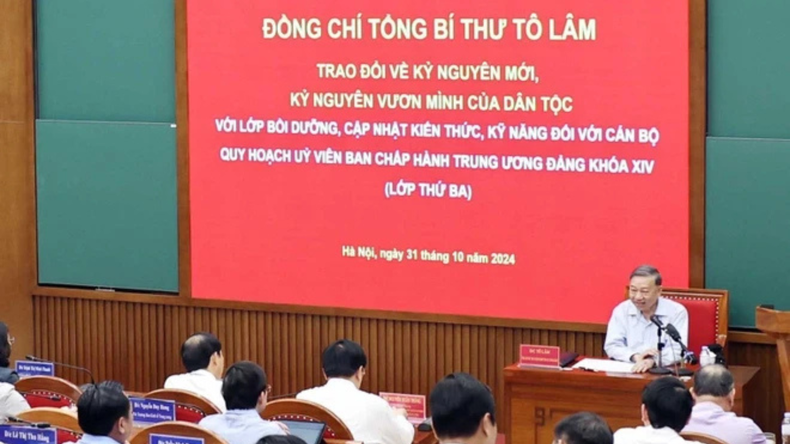 |
| General Secretary To Lam talks with the 14th Party Central Committee planning cadre trainees about the new era, the era of national growth. (Photo: VNA) |
The General Secretary said that if there is not enough electricity for production, many large investors may consider not entering or withdrawing from Vietnam. Emphasizing that time cannot wait, the General Secretary directed that the Electricity Law must be drastically revised to meet practical requirements.
The General Secretary's instructions have demonstrated high political determination, looking directly at economic and social bottlenecks to remove them by the leaders of our Party and State.
To the electric formula for development
Speaking at the National Assembly forum, Minister of Industry and Trade Nguyen Hong Dien repeatedly mentioned the figures calculated by scientists. For Vietnam's GDP to grow by 1%, electricity must grow 1.8-2% ahead.
Implementing Resolution 55 of the Politburo, the Power Plan VIII has set out the numbers and structures for each type of power source. To have enough electricity for development, from now until 2030, which means only nearly 6 years left, Vietnam must increase the total power source capacity to 150,000-160,000 MW, double the current total capacity.
Meanwhile, coal and hydropower have reached their development limit. Renewable energy power needs a certain base source of electricity to develop. And one of the most feasible solutions is to develop liquefied gas power. Power Plan VIII has determined that the renewable gas power source from LNG (abbreviated as "LNG") will account for about 14.9% of the total capacity of the entire national power generation system by 2030.
The construction of 13 new LNG power plants with a total capacity of 22,400 MW by 2030 and two more plants with a capacity of 3,000 MW by 2035 is an important part of the national power development plan. The Power Plan VIII also sets out the task of racing against time, by 2030, to complete the construction of 13 LNG power plants from North to South.
And to build those 13 factories, where will the LNG come from? It will definitely have to be imported from abroad, and Qatar is one of the top choices.
With the world's 13th largest crude oil reserves and the world's largest helium reserves, Qatar is currently the world's leading producer and exporter of liquefied natural gas and the world's largest producer of helium.
What to do now
In the early years of renovation, General Secretary Nguyen Van Linh once raised the message “Things that need to be done immediately” so that the entire political system could look straight at the truth and remove the limitations and shortcomings of the centralized bureaucratic subsidy mechanism. Currently, that spirit needs to continue to be aroused in the energy sector.
One of the “immediate tasks” of the two countries at present is to remove difficulties for energy development, including international cooperation in this field. During the meeting between Prime Minister Pham Minh Chinh and the Qatari Minister of State in charge of energy, both the Minister of State and the General Director of the Vietnam Oil and Gas Group Le Ngoc Son mentioned difficulties due to mechanisms and legal regulations. It is impossible to import “fast, large, good, cheap” LNG without removing institutional obstacles.
While, as the General Secretary once said, “time does not wait,” a project takes many years to implement. The Secretary of State also frankly said that he is an engineer and a business owner, so he only talks in numbers. When Vietnam amends the Electricity Law, then the signing, cooperation, price, quantity, etc. can be discussed! He is also just waiting for Vietnam to amend the Law.
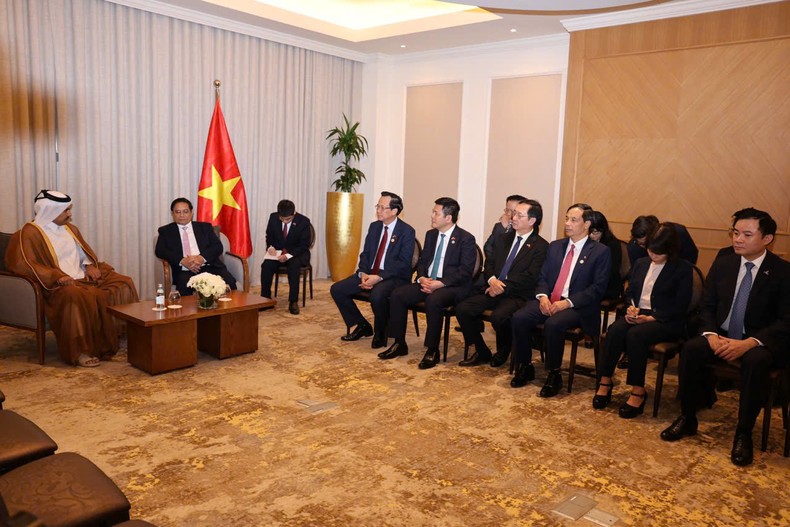 |
Scene of the working session between Prime Minister Pham Minh Chinh and Qatari Minister of State in charge of Energy Saad bin Sherida Al Kaabi. |
On the sidelines of the business trip, we met Mr. Pham Van Phong, General Director of PV GAS, the company whose name occupies the entire periphery of the Vietnamese gas industry. Mr. Phong has previously shared many times his desire to remove and amend legal regulations in order to develop gas power plants. In 2023, Vietnam will import the first LNG train to start the big dream of gas power while in the world, developed industrial countries are 40 years ahead, such as Japan, which welcomed the first LNG train in 1969. Since then, Japan has strongly developed the LNG industry.
Obviously time will not wait if the Electricity Law is not amended as soon as possible.
Prime Minister Pham Minh Chinh’s trip to attend the Future Investment Initiative Forum can be considered a trip to find new energy sources for the future. Coincidentally, the leaders of the oil kingdoms all emphasized the phrase “time and intelligence”. These are two elements that make up development. Without intelligence and breakthrough thinking, the development time will be prolonged due to stagnation. But if you have intelligence and a development direction but do not find the fastest way and the shortest time to realize it, everything will still be stagnant.
Removing bottlenecks, paving the way for electricity development in the era of national growth
To realize the era of the Vietnamese nation's rise as General Secretary To Lam proposed, finding new energy sources to provide enough electricity for development is one of the "immediate tasks" and a life imperative.
In a recent discussion on the new era - the era of national development, General Secretary To Lam outlined 7 strategic orientations to bring the country into the era of national development, emphasizing the need to resolve the issue of the legal system still having contradictory and overlapping provisions, not suitable for economic and social development, and being slow to be supplemented, amended, and replaced. Mechanisms, policies, and laws have not created a truly favorable environment to promote innovation and attract resources from domestic and foreign investors as well as from the people.
Of the three biggest bottlenecks today, namely institutions, infrastructure and human resources, institutions are the “bottleneck” of “bottlenecks”. The General Secretary requested a change in thinking about law-making in a direction that both ensures the requirements of State management and encourages creativity, liberates all productive forces, and unlocks all resources for development.
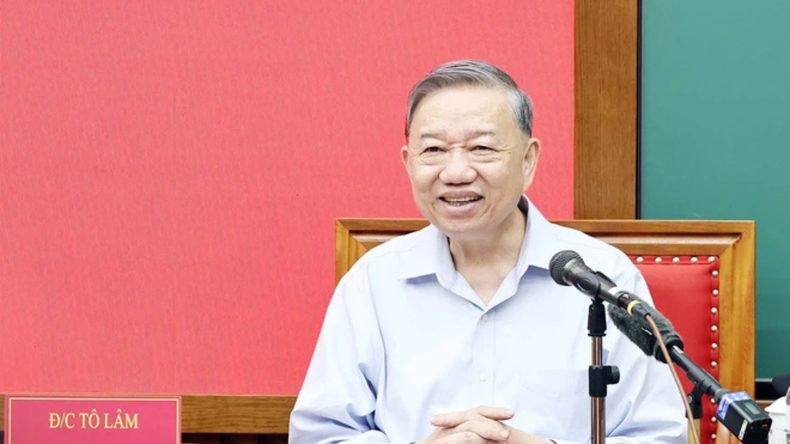 |
| General Secretary To Lam talks with the 14th Party Central Committee planning cadre trainees about the new era - the era of national growth. (Photo: VNA) |
“Stick closely to reality, stand on the ground of Vietnamese reality to build appropriate legal regulations; learn from experience while doing; do not be hasty, but also do not be perfectionist, so as not to lose opportunities; take people and businesses as the center and subject; regularly evaluate the effectiveness and quality of policies after promulgation to promptly adjust inadequacies and conflicts, minimize loss and waste of resources; proactively detect and quickly remove "bottlenecks" caused by legal regulations", General Secretary To Lam emphasized.
I think those instructions are very clear and timely in solving the story of amending the current Electricity Law.
The imperative of life requires us to remove legal bottlenecks, amend the Law for development, and find a path for breakthrough development right under our feet!
Although it has become the king of the energy industry, Qatar has had a vision for the future since 1996, when the then Emir of Qatar, Hamad bin Khalifa al Thani, invested heavily in liquefaction technology to be able to carry natural gas in liquid form that can be transported by large ships. Qatar, though still a poor country at that time, took the risk of investing a lot of money in developing these technologies to increase the value of their gas industry. To date, Qatar has the cheapest cost of exploiting and liquefying gas in the world. Qatar continues to look ahead, bringing the money earned from gas to invest around the world with the Qatar Investment Fund with a total asset value of up to 440 billion USD, "spreading" investment money globally... |
Source: https://moit.gov.vn/tin-tuc/phat-trien-nang-luong/khi-thu-tuong-tran-tro-sua-doi-luat-dien-luc-giua-cuong-quoc-khi-lng.html



![[Photo] Many streets in Hanoi were flooded due to the effects of storm Bualoi](https://vphoto.vietnam.vn/thumb/1200x675/vietnam/resource/IMAGE/2025/9/29/18b658aa0fa2495c927ade4bbe0096df)
![[Photo] General Secretary To Lam attends the ceremony to celebrate the 80th anniversary of the post and telecommunications sector and the 66th anniversary of the science and technology sector.](https://vphoto.vietnam.vn/thumb/1200x675/vietnam/resource/IMAGE/2025/9/29/8e86b39b8fe44121a2b14a031f4cef46)
![[Photo] National Assembly Chairman Tran Thanh Man chairs the 8th Conference of full-time National Assembly deputies](https://vphoto.vietnam.vn/thumb/1200x675/vietnam/resource/IMAGE/2025/9/29/2c21459bc38d44ffaacd679ab9a0477c)
![[Photo] General Secretary To Lam chairs the meeting of the Central Steering Committee on preventing and combating corruption, waste and negativity](https://vphoto.vietnam.vn/thumb/1200x675/vietnam/resource/IMAGE/2025/9/29/fb2a8712315d4213a16322588c57b975)
![[Photo] General Secretary To Lam receives US Ambassador to Vietnam Marc Knapper](https://vphoto.vietnam.vn/thumb/1200x675/vietnam/resource/IMAGE/2025/9/29/c8fd0761aa184da7814aee57d87c49b3)














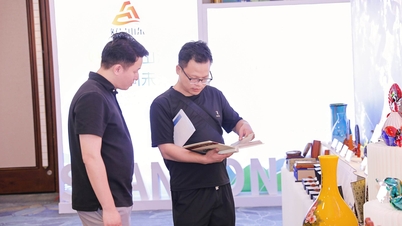

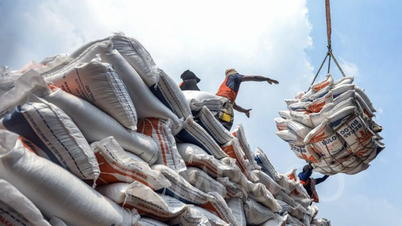













































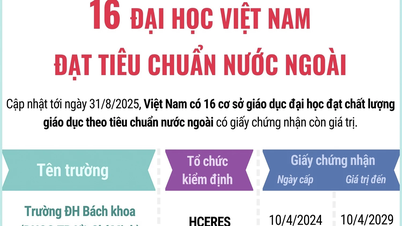



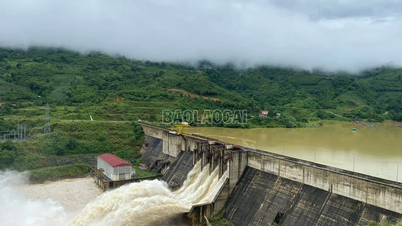
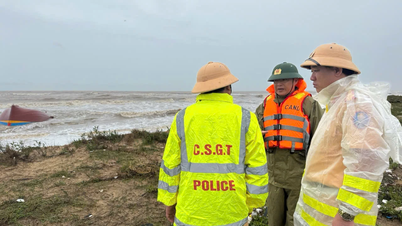

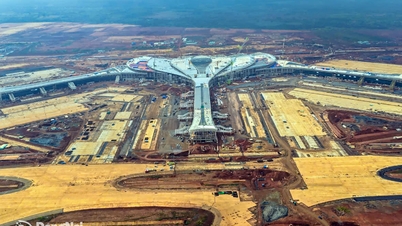











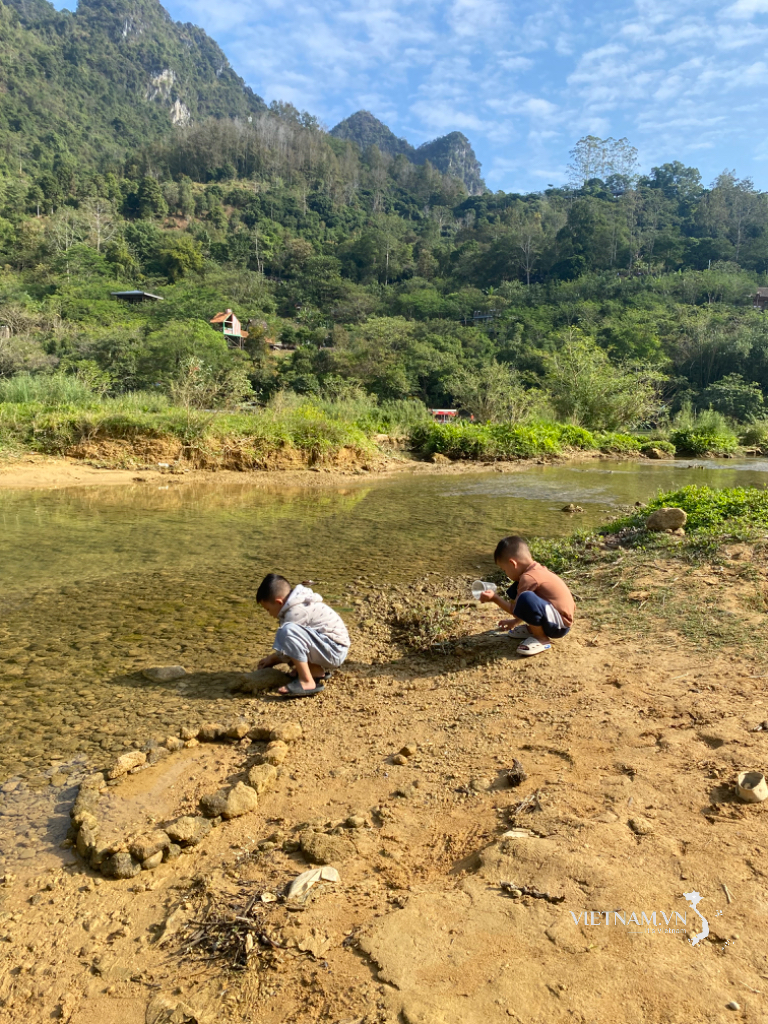


Comment (0)